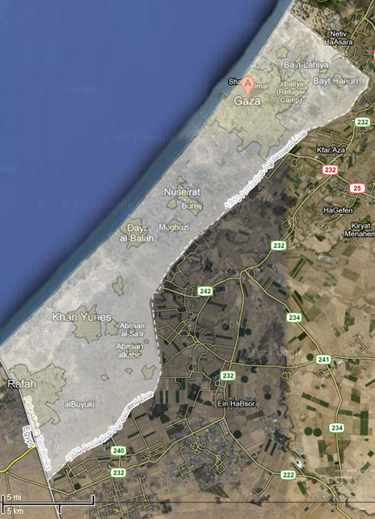The World, a popular radio news that airs on over 300 stations across America, is a co-production of the BBC, Public Radio International, and WGBH/Boston. So it wasn’t a surprise when host Aaron Schachter turned to a BBC journalist during the Nov. 15 program about the conflict between Israel and the Hamas-ruled Gaza Strip.
Unfortunately it also wasn’t surprising when Paul Danahar, the BBC reporter, seemed to justify the use of Palestinian population centers by terrorists firing rockets into Israel, an act that violates international law. The BBC has long tended toward anti-Israel reporting, a bias that was apparent just one day earlier when Wyre Davies, a BBC reporter in Gaza, claimed that “almost all” of the fatalities in the fighting were civilians, although even Hamas itself admitted that most of its dead were militants.
On The World, Danahar asserted that it was virtually impossible for Hamas to avoid residential areas when firing into Israeli towns:
Schachter: Now Israeli Prime Minister Benjamin Netanyahu says Israel is doing everything in its power to avoid civilian casualties, but he says Hamas is firing from residential areas. Is that happening?
Danahar: Well, where my bureau is, there are residential accommodation around, and there are rockets going off — I think the thing about Gaza, to be honest with you is, it’s an incredibly small place and there’s a lot of people in it. So pretty much everywhere in Gaza is a residential area unless you’re going right up to the kind of “no man’s land” area between Israel and where Gaza kind of properly starts. So there certainly are things being fired off from residential areas but it’s almost, probably, impossible to get entirely away from a residential area if you want to fire something off.
Danahar then quickly pivots to say that “the key factor here” is the accuracy of Israel’s counter strikes. In other words, according to the BBC journalist, the key factor is not the use of human shields by Palestinian terrorists, nor is the indiscriminate rockets that they fire into Israel, but rather the accuracy of Israeli tank shells. (Segment begins at 2.24.)
Putting aside the apparent discomfort of the reporter when asked about human shields — you have to actually listen to the segment to hear how begrudging his admission sounds — is it true that it is “almost probably impossible” for Hamas and other terror groups to launch rockets without using Palestinian civilians as shields?
It takes little more than a glance at at Google Maps’ satellite view of the Gaza Strip to learn that Danahar’s claim is patently false. Although (or because) cities in the Gaza Strip are densely populated, most of the territory is farmland or other empty space.
The image below overlays a map of population centers in the Gaza Strip with Google’s satellite view. The overlay corresponds very closely with satellite imagery of the Strip.

Even the BBC itself has online maps showing that most of Gaza is not residential.
Although the Israeli operation in Gaza is only a few days old, BBC reporters have quickly shown themselves to be unwilling to report ethically or accurately about the fighting. Why do they grossly exaggerate the proportion of civilians among the Palestinian war dead, and why do they misinform readers in order to defend war crimes by terrorists? It is possible that the Balen Report provides answers to those questions, but the BBC has been working hard to suppress the report’s findings. Regardless of the answer, the BBC has to commit itself to ending such bias if it wants to reverse its reputation as an organization that is fundamentally hostile toward Israel.
